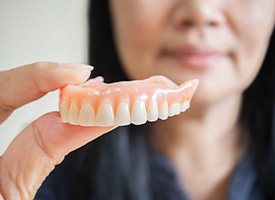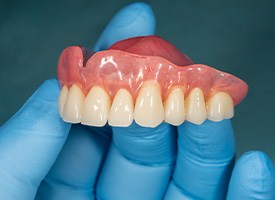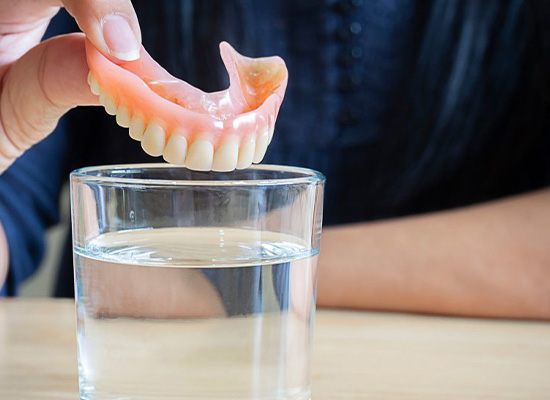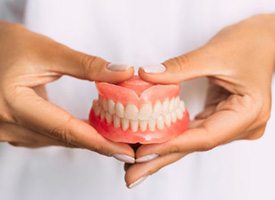

For millions of Americans, tooth loss means damage to their self-esteem along with the negative dental health effects that occur daily. Besides feeling embarrassed about your appearance, significant tooth loss can increase your risk of additional missing teeth, decay, infection, and decreased jawbone density. Thankfully, we can restore your quality of life and confidence with partials and dentures in Kingwood. We have the solutions you need to bring back a complete smile to overcome the limitations of tooth loss.


If you’ve lost several or all your teeth, you might be a candidate for partials or dentures. Your dentist in Kingwood will evaluate your severity of tooth loss and dental health to create a personalized treatment plan to restore your smile. In some cases, you may need additional procedures to prepare your mouth for dentures, like periodontal therapy or tooth extractions. Most patients who have good oral and general health can benefit from dentures. Read on to learn more about what makes a good candidate for dentures.

Losing one or more of your pearly whites can affect much more than your smile and ability to chew and speak. Many times, those struggling with tooth loss may also experience significantly reduced self-confidence, which can cause them to have feelings of sorrow and depression. You may even begin to avoid engaging in social interactions or activities to prevent showing your smile. Furthermore, without treating tooth loss, you can end up experiencing other complications with your oral and overall health, including worn tooth enamel, malnutrition, and indigestion.

Other than missing one, several, or all of your teeth, you will likely be eligible for dentures if you’re free of any underlying problems, both for your oral and overall health. Our team will need to first ensure that you don’t have any growing issues such as gum disease, decay, or infection. Leaving this unchecked before receiving your dentures can lead to more complications down the road. We will be sure to discuss your situation in detail during your initial consultation, such as your medical and dental history, so that you know what to expect with your treatment.

Although dentures are an incredibly reliable and versatile option for replacing missing teeth, they aren’t the only solution available. Other than traditional prosthetics, our team can provide you with alternative tooth replacements, including:

Every patient’s needs are unique. Depending on the number of teeth you’ve lost and your goals, you might be a candidate for:

A partial denture consists of several teeth affixed to a gum-colored base that has a metal framework. This allows it to clip or clasp onto your remaining teeth to stay in place. Your new teeth will match the appearance of your real ones to blend in seamlessly when you smile.

Dr. Mosby offers modern, natural-looking dentures to treat complete tooth loss in one or both arches. A comfortable and durable acrylic base is created to fit your mouth. The gum-colored arch will feature custom-made prosthetic teeth. It is held in place using suction or an adhesive. Although they have a bad reputation for looking fake, our office uses the latest advancements in dentistry to design dentures that closely mimic your real teeth.

Implant dentures use titanium posts to replicate your tooth roots. They are surgically placed into your jawbone to hold your denture in place. You won’t need to worry about any slipping or irritation. Not to mention, you’ll enjoy a solution that can last for decades without worrying about soaking your denture or special cleaners.

Once you’ve decided to get dentures to reclaim a complete smile, the next step is to actually make your prosthesis. This involves carefully choosing the best materials for the job and ensuring that the final denture has been customized according to your unique needs. Learning about how dentures are created can help you gain a greater appreciation for your new teeth, so read on to find out more about the process.

While the base of the dentures – the part that supports the artificial teeth – can be made out of a variety of materials, acrylic tends to be the most popular option. Not only can it be customized to closely resemble your gums, but it’s also relatively easy to repair. In certain situations, nylon might be used instead of acrylic.
As for the artificial teeth of the denture, porcelain is often highly recommended. It has a very natural appearance, to the point that it even mimics the way that real tooth enamel reflects light. And of course, it is highly durable, which is definitely important considering how often you will be using your dentures to bite and chew your food.

In order to determine the correct shape and size for your dentures, our team will need to capture impressions of your upper and lower gums. Using said impressions, we’ll create a model of your mouth, which will then be sent to a dental laboratory.
The technicians at the lab will begin the process of making your dentures. A wax version of your gumline will be created, and the artificial teeth will be carefully inserted into the appropriate positions. After the necessary adjustments have been made, the wax dentures will be sent to us so that we can confirm that they fit properly.
Once the wax dentures have been returned to the dental lab, they will be placed into a flask. The technicians will add plaster to the flask to help the dentures maintain their shape. Then they will expose the flask to hot water, causing the wax portions of the dentures to melt away. After that, acrylic will be injected into the flask so that it can act as the new base for the prosthesis.
The completed dentures will be taken out of the flask. If there’s any leftover plaster, it will be removed with an ultrasonic bath. Unneeded acrylic material will be carefully trimmed away. Then, after a final polishing, the dentures will be sent to our office one last time. At that point, all that’s left to do is schedule your final fitting appointment so that you can receive your new teeth!

You may experience some discomfort when you first start wearing your dentures. This is completely normal, and it should fade once your mouth has had time to adjust. Eating soft foods and performing facial exercises can often help while you’re still getting used to your new teeth. Please let us know if the discomfort doesn’t seem to be going away; it may be necessary for us to adjust your dentures.

Now that you know more about the types of dentures and how they’re created, you’re probably wondering how exactly they benefit you. Once-basic tasks like eating, speaking, and smiling authentically become much more challenging when teeth are missing. These prosthetics remain a popular way to restore some or all your missing teeth because they’re a versatile solution that provides many advantages simultaneously.
Continue reading to learn more about the many advantages of having dentures, and feel free to contact us with additional questions.

The changes to your reflection, as well as your abilities, can leave you feeling self-conscious about your oral condition. Gaps in your grin can hinder your ability to pronounce certain words or chew your food thoroughly. As a result, you might become anxious, depressed, or avoid spending time with others to avoid potential judgment.
With this lifelike restoration in place, you’ll regain your sense of self. You’ll be able to eat, converse, and grin much more normally to enjoy a more active social life.

Your teeth play a critical role in forming certain sounds and words because your tongue presses against them in specific ways to enunciate them. When some go missing, you could develop a lisp or other changes to your speech patterns that make it harder to be clearly understood.
It can take about a month for your tongue, lips, and supporting muscles in your mouth to adjust to functioning with dentures. However, once they do, you’ll be able to communicate with much more clarity.

Many foods rich in vitamins, minerals, and other necessary nutrients are hard to eat without a full set of teeth. For example, raw fruits, vegetables, and chewy meats all require a powerful bite force to grind thoroughly enough to be digested.
Missing teeth can often lead to gastrointestinal issues or malnutrition if you cannot chew sufficiently or stick to a softer diet. Your prosthetics allow you to enjoy various foods to support your dental and overall well-being.

If you have natural teeth remaining, they’re prone to drifting out of alignment to fill in any empty spaces. This can harm them because it prematurely wears down your enamel, leaving them vulnerable to decay, disease, or injuries.
Wearing dentures ensures that your teeth stay in their rightful places to safeguard your smile.

One of the first things people notice about you is the quality of your smile. You’ll want to look your very best to leave a lasting impression during important occasions like job interviews or presentations. In fact, one study in 2019 found that the probability of being employed is negatively associated with poor oral health. The better your teeth look and feel, the more likely you will succeed.

Although you can’t put a price on a confident smile, we understand that dentures come at a cost and that you are likely concerned about it. Because each mouth requires unique care, and we refuse to give cookie-cutter service, it’s not possible to provide a general estimate for dentures for everyone. The only way to learn how much your dentures will cost is to have a consultation with us. After a complete examination, we can put together a treatment plan with an associated cost.

When calculating the pricing of dentures, we consider several things, including how many teeth are being replaced. Also, depending on the type of denture, as well as the materials used, dentures can vary in cost. If you require preliminary work, such as extraction or gum disease treatment, these types of procedures will increase your overall cost. If you’d like a more detailed breakdown of the cost, we will be happy to supply you with the transparent information you want.

Most of the time, implant dentures do cost more than traditional dentures. But, as the saying goes, you get what you pay for! With normal dentures, you replace only the visible portion of your missing dentition, whereas implant dentures compensate for the entire tooth—including the root. These prosthetic tooth roots keep the jawbone stimulated and healthy, which prolongs the lifespan of the dentures on the surface. As a result, a patient who has implant dentures may spend more upfront, but they may not have to replace their dentures for multiple decades, saving them significant money in the long term.

Overall, dental insurance plans do cover part of the cost of dentures. In fact, more often than not, the cost is cut in half because of insurance. When you come in for your appointment, we can check your policy’s coverage and let you know what it will contribute and how much you’ll be expected to pay out-of-pocket.

With or without dental insurance, the price of dentures may not be feasible to pay all at once. Or perhaps it just would be more financially comfortable to pay for them over time. CareCredit is a well-reputed national financing company that divides your out-of-pocket total into smaller monthly installments. We can help you in the application process and answer any questions you may have.

Since they’re not made out of dental enamel, dentures technically can’t develop cavities. While that’s great, there’s still plenty of good reasons to take care of your prosthetic! Firstly, you can still develop gum disease and other oral conditions, so it’s important to keep your mouth – and your dentures – as clean as can be. Secondly, routine maintenance is the best way to ensure your dentures last for as long as possible. Read up on the information we’ve put together below for our recommended care tips.

The key with removable dentures is to take them out for periodic cleaning. Food particles and bacteria can slip underneath them – and they’re also much easier to clean when they’re not in your mouth! Rinse them after every meal with lukewarm water, and that should help prevent uncomfortable build up.
To clean your dentures more thoroughly, you should brush them with dish soap or hand soap at least once a day. You might reach for toothpaste out of habit, but the ingredients in most products are just rough enough to damage your dentures. Stiff bristled toothbrushes are problematic for the same reason – instead, make sure you have a soft bristled brush.
It can be bothersome enough to have to replace something. When you need a replacement due to a moment of carelessness, it feels even worse. We recommend keeping your dentures in a safe place while they’re removed, just in case they get accidentally crushed or chewed up by the household pet.
Once your mouth gets adjusted to your new prosthetic, it’s generally safe to wear them all day – we encourage it, even! However, your gums need to breathe in order to stay healthy. It’s harder for them to circulate properly while supporting dentures, so removing your replacement teeth at night gives them a much-deserved break.
Plus, this gives you the chance to let your dentures take a good soak in some denture cleaning solution. This is a great way to ensure they’re sanitized – just make sure to rinse them off before putting them back in your mouth!
Changes to your gums, lips, or the way your dentures feel could indicate they need an adjustment or that an underlying problem is causing complications. If something doesn’t seem quite right or is out of the ordinary, give us a call and describe your symptoms. We’ll help you make next-step arrangements and take care of you.

All-on-4 dentures use dental implants to stay anchored in place. In many ways, this simplifies the aftercare process. You can essentially maintain them like you would regular teeth. In other words, be sure to:
Dr. Mosby uses advanced technology to take impressions of your mouth to carefully craft your dentures to match your smile. You’ll advantage from maximum comfort and aesthetics for greater stability and a beautiful smile you’ll want to show off. Contact our office today to schedule your consultation to renew your smile.
If you’re undergoing extractions, you’ll have to wait about six to eight weeks after your procedure to receive your dentures. While two months may sound like a long time, it’s necessary to give your gums sufficient healing time. It’s also worth noting that the exact amount of time you’ll need to wait after having your teeth pulled will vary depending on the type of denture you receive.
Immediate dentures can be placed on the same day as tooth extractions, but they will need to be replaced earlier than anticipated because the shape of your jawbone will change as you heal. If you’re getting implant dentures, you will need to wait about three to six months for the titanium posts to fuse with the surrounding bone tissue.
Initially, you’ll be asked to wear your dentures for an entire 24 hours, including sleep. However, after that adjustment period you should be taking your prosthetics out every evening. Wearing dentures restricts the circulation in your gums, potentially leading to soft tissue irritation and speeding up ridge resorption. By taking out your dentures regularly, you can give your gums a chance to recover and get the nutrients they need at night. In addition, sleeping with dentures has been found to be associated with a higher risk of pneumonia and poor oral hygiene.
When you first get dentures in Kingwood, you may have difficulty speaking and pronouncing certain words. That’s mainly because you’re so used to speaking with natural teeth. Luckily, the more you practice, the faster you’ll adjust to your new prosthetics. You can speed up the process by reading aloud, repeating difficult-to-pronounce words, and having more conversations with loved ones. If needed, you can use denture adhesive for extra stability.
Missing teeth can cause your facial muscles to sag, giving your face a sunken appearance. By getting dentures in Kingwood, you’ll provide support to the facial muscles that have collapsed, improving your appearance. They’ll allow you to maintain a youthful appearance for years to come! Keep in mind that ill-fitting dentures may not give your facial muscles proper support, which is why you need to make sure each restoration fits perfectly in your mouth.
I Need a Checkup & Cleaning I am Looking for a Dentist for My Child I Want Completely Healthy Gums I am in Pain/Had an Accident I Have a Cavity or Broken Tooth I am Missing One or More Teeth I Want to Enhance My Smile I Would Like a Straighter Smile I am Nervous/Afraid of the Dentist View Our Services